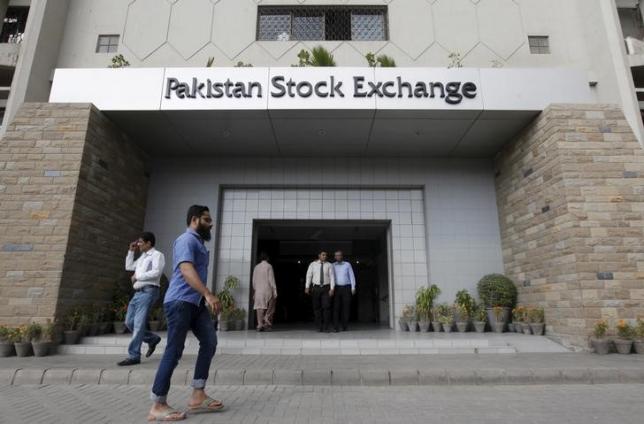From Zeeshan Mirza
KARACHI: Pakistan’s stocks closed at a record high on Monday as investors binge-bought, cheering a new deal reached with the International Monetary Fund (IMF) believed to bail out the battered economy, traders said.
Pakistan and the IMF struck a staff-level agreement (SLA) for a 37-month-long, $7 billion loan programme with tough measures such as raising tax on farm income.
The Pakistan Stock Exchange’s (PSX) benchmark KSE-100 Shares Index surged 1211.51 points or 1.52% to reach 81,155.60 points compared to the previous close of 79,944.10 points.
The SLA caps negotiations that started in May after Islamabad completed a short-term, $3 billion programme that helped stabilise the economy, avert a sovereign debt default and set challenging revenue targets in its budget to get IMF approval.
The benchmark share index has almost doubled since Pakistan signed its last SLA for the $3 billion standby arrangement, and is up more than 10% since Pakistan presented its annual budget.
“The market has grown used to the IMF deal being a highly politicised, news event and the IMF asking Pakistan to do more. This time it was a silent agreement between the government and the IMF staff,” said Adnan Sami Sheikh, assistant vice president of research at Pak Kuwait Investment Company.
EFG Hermes Pakistan’s CEO Raza Jafri, while speaking to Geo.tv, said the market is reacting positively to the SLA with the IMF for a $7 billion agreement spanning over 37 months.
“This is expected to help support macroeconomic stability and help Pakistan conduct necessary reforms in areas such as taxation, energy, and more equitable spending between the centre and the provinces,” said the analyst.
Analyst Ahsan Mehanti at Arif Habib Corp said the stocks reached an all-time high as investors weighed the SLA with IMF on the $7 billion Extended Fund Facility. “Speculation on easing SBP (State Bank of Pakistan) rates played a catalyst role in bullish activity of the earnings season,” he added. The stocks had Friday witnessed a volatile session after the decision of the Supreme Court on reserved seats, decreasing by 48.26 points or 0.06% to close at 79,944.10 points.
The new agreement introduced increased tax on agricultural incomes, underscoring the need to increase government revenue and reduce recurrent deficits to win the lender’s approval.
The IMF said it had got assurances from Pakistani authorities – provincial and federal – that they would bring taxation on agricultural incomes on par with corporate and other tax rates.
Agricultural income has historically been taxed much lower than other sectors, despite contributing 23% to the GDP, employing 35% of the labour force, and bringing in an annual income of around 9 trillion Pakistani rupees ($32.37 billion).






